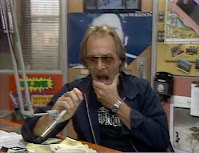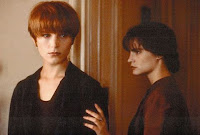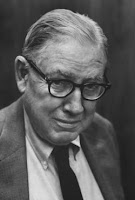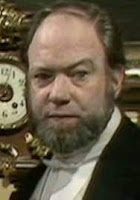[Johnny Caravella, a much-travelled deejay, fired in a prior radio gig for using the word “booger” on air, has just been told by new station manager Andy Travis that the new format change to rock ‘n’ roll means he won’t have to play the Hallelujah Tabernacle Choir’s cover of "You're Having My Baby" anymore.]
Johnny Caravella
[played by Howard Hesseman] [about changing the format of the
station]: “Ah, listen, you, you do mean now?”
Andy Travis
[played by Gary Sandy] [as he leaves the control booth]: “Yes.
And... you can say ‘booger’ if you want to.”
Johnny [gleefully
flinging an old record off a turntable]: “Well, it's good-bye to the
elevator music!”
[Johnny laughs as he carefully places a different
record on the turntable]
Johnny [with a sinister
grin slowly emerging on his face]: “Do it!”
Johnny [making the
needles scratching the record sound effect, as he begins to speak on the air
excitedly]: “All right, Cincinnati, it is time for this town to get down!
Now, you got Johnny...Dr. Johnny Fever, and I am burnin' up in here!
Whoo! Whoo! We all in critical condition, babies, but you can tell me where it
hurts, because I got the healing prescription here from the big 'KRP musical
medicine cabinet. Now I am talking about your 50,000-watt intensive care unit,
babies! So just sit right down, relax, open your ears real wide and say, ‘Give
it to me straight, Doctor, I can take it!’"
[Johnny starts Ted Nugent's "Queen of the
Forest" on the record, flails his arms in the air in excitement, then sits
in his chair grabbing the mic.]
Johnny [putting on
his sunglasses]: “I almost forgot, fellow babies: ‘booger!’"— WKRP
in Cincinnati, Season 1, Episode 1, “Pilot: Part 1,”
original air date Sept. 18, 1978, teleplay by Hugh Wilson, directed by Jay Sandrich
The four-year run of the fine sitcom WKRP in
Cincinnati covered exactly my time as an undergrad. No matter how busy I
got, I always tried to make room in my schedule for the show.
Although the kind of workplace ensemble comedy that
became so common in the decade after the premiere of The Mary Tyler Moore
Show, WKRP seemed to reach its zany heights with its most extreme
character, Dr. Johnny Fever. I felt particularly sad, then, when I read that
the man who brought him to life, Howard Hesseman, had passed away this
weekend.
Hesseman would have similar moderately long stints
over the following decade—in the final season of One Day at a Time, as
Ann Romano’s second husband, and Head of the Class, as a teacher of
exceptional students. But he made his biggest impact with WKRP, perhaps
because, back in the day, he was familiar with Johnny’s lifestyle.
None of that is meant to deny Hesseman’s very real
talent as a versatile character actor, demonstrated in over 50 years of TV
credits (starting with a distinct contrast with Dr. Johnny: a hot dog vendor in
an auto show, in the final season of The Andy Griffith Show.)































